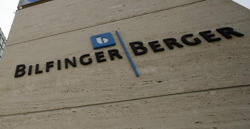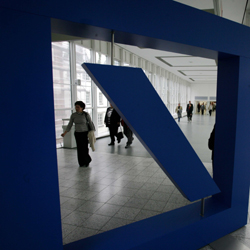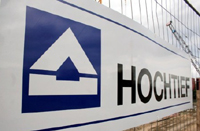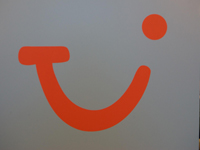VIPsight - January 2011
COMPANIES
Bilfinger Berger wants to monetize Valemus
 In July 2010 Germany’s second-biggest construction group Bilfinger Berger had already attempted to bring its Australian subsidiary Valemus to the stock exchange. At the last second, however this IPO was called off; the estimated proceeds would have been too small. Now Australian construction group LendLease has confirmed that it was in talks with Bilfinger Berger about selling the subsidiary down under. The purchase price appears to be in the triple digits of millions. Bilfinger has admitted that an IPO was just as likely as a sale. With the €800 million hoped for, CEO Herbert Bodner wants to expand the service business and thus gradually move away from pure construction business.
In July 2010 Germany’s second-biggest construction group Bilfinger Berger had already attempted to bring its Australian subsidiary Valemus to the stock exchange. At the last second, however this IPO was called off; the estimated proceeds would have been too small. Now Australian construction group LendLease has confirmed that it was in talks with Bilfinger Berger about selling the subsidiary down under. The purchase price appears to be in the triple digits of millions. Bilfinger has admitted that an IPO was just as likely as a sale. With the €800 million hoped for, CEO Herbert Bodner wants to expand the service business and thus gradually move away from pure construction business.
Conergy rescued
 On 17 December creditors decided to secure Conergy’s debts. They have thus averted threatened bankruptcy for the foreseeable future. An AGM at latest in February is now to decide to reduce the capital by seven eighths, from €400 million to only €50 million, in order then at a second stage to raise it again to €188 million. That would bring the debts of the group, in difficulties following exaggerated expansion, down from €323 million to €135 million. It will be interesting to see whether old shareholders exercise their preemption rights. Currently Commerzbank is the biggest holder at 29.08%, followed by the Sprüngmann brothers and their AthosService GmbH with 14.95% and Dieter Ammer with 3.79%. If they do not subscribe their full amounts, the two British hedge funds York and Sothic Capital might raise their holding. They had bought loans from creditor banks at a discount of up to 60% and could convert their debt certificates, to a value of €188 million, into shares, taking over the say in the group for themselves with a share block of up to 68%. That might threaten the breakup of the group. Conergy had already hived off parts of its wind-power business in December.
On 17 December creditors decided to secure Conergy’s debts. They have thus averted threatened bankruptcy for the foreseeable future. An AGM at latest in February is now to decide to reduce the capital by seven eighths, from €400 million to only €50 million, in order then at a second stage to raise it again to €188 million. That would bring the debts of the group, in difficulties following exaggerated expansion, down from €323 million to €135 million. It will be interesting to see whether old shareholders exercise their preemption rights. Currently Commerzbank is the biggest holder at 29.08%, followed by the Sprüngmann brothers and their AthosService GmbH with 14.95% and Dieter Ammer with 3.79%. If they do not subscribe their full amounts, the two British hedge funds York and Sothic Capital might raise their holding. They had bought loans from creditor banks at a discount of up to 60% and could convert their debt certificates, to a value of €188 million, into shares, taking over the say in the group for themselves with a share block of up to 68%. That might threaten the breakup of the group. Conergy had already hived off parts of its wind-power business in December.
Deutsche Bank swallows Postbank
 In early October Deutsche Bank offered Deutsche Postbank shareholders to take over their shares as part of a public offering. Germany’s biggest private bank was thus able to assure itself of the majority in the Bonn institution at 51.98%. To take over the Postbank shares as part of the bid, Josef Ackermann, Deutsche Bank CEO, had to find some €1.2 billion, making his bank slip down into the red in the third quarter. In order, however, to get the OK from the US authorities, the Frankfurt people had in the meantime lowered their holding to 49.95% and sold part of their block to Société Générale. Since the green light has now come from the US in mid-December, the Bonn bank with its 14 million private customers can now be consolidated on the Deutsche Bank books retroactively to 3 December. That means the announced takeover is fully on schedule. The remaining nearly 40% of Postbank shares are held by Deutsche Post. This block can be taken over by Deutsche Bank as from February 2012, in order finally to be able to make a control agreement with the Bonn bank.
In early October Deutsche Bank offered Deutsche Postbank shareholders to take over their shares as part of a public offering. Germany’s biggest private bank was thus able to assure itself of the majority in the Bonn institution at 51.98%. To take over the Postbank shares as part of the bid, Josef Ackermann, Deutsche Bank CEO, had to find some €1.2 billion, making his bank slip down into the red in the third quarter. In order, however, to get the OK from the US authorities, the Frankfurt people had in the meantime lowered their holding to 49.95% and sold part of their block to Société Générale. Since the green light has now come from the US in mid-December, the Bonn bank with its 14 million private customers can now be consolidated on the Deutsche Bank books retroactively to 3 December. That means the announced takeover is fully on schedule. The remaining nearly 40% of Postbank shares are held by Deutsche Post. This block can be taken over by Deutsche Bank as from February 2012, in order finally to be able to make a control agreement with the Bonn bank.
Deutsche Wohnen moves into the MDAX
After the takeover bid from Deutsche Bank to Deutsche Postbank shareholders, the dispersed holdings of the Bonn share felt below the 10% mark. Deutsche Börse rules provide in such cases for a so-called fast exit. With effect from 8 December, accordingly, the bank share dropped out of the MDAX into Prime Standard. The previously SDAX-listed real-estate firm Deutsche Wohnen has replaced the Bonn bank in the MDAX.
ACS likely to win at Hochtief
 Despite considerable resistance by the Essen construction group Hochtief, its Spanish competitor ACS will probably prevail with its offer. ACS tried up to the year’s end to increase its stake in the German construction specialists to over 30 percent, to be able to take it over later at a lower price. However, the Esseners fought doggedly to the end against the inroads. In late November, Hochtief boss Herbert Lütkestratkötter had to accept a defeat when Australian takeover authorities decided on appeal that ACS need not present any separate bid for Australian subsidiary Leighton. Additionally, the Federal Institute for Financial Services Oversight (BaFin) authorized a voluntary bid by the Spaniards to Hochtief shareholders. In early December ACS held just under 30%. The object of the voluntary bid was to get the ACS share of Hochtief up to just over 30%. For if the 30% mark is crossed in time, a compulsory offer need not be made, as is otherwise usual with crossings of thresholds. That would have to be in relation to the average share price on the exchange, and would thus cost ACS dear. With BaFin acceptance, in early December ACS offered Hochtief shareholders initially eight ACS shares for five Hochtief ones; well below the present price. And accordingly the acceptance rate was, as desired, low even after two weeks. Shareholder association Deutsche Schutzvereinigung für Wertpapierbesitz (DSW) criticized the offer as an “alibi” bid.
Despite considerable resistance by the Essen construction group Hochtief, its Spanish competitor ACS will probably prevail with its offer. ACS tried up to the year’s end to increase its stake in the German construction specialists to over 30 percent, to be able to take it over later at a lower price. However, the Esseners fought doggedly to the end against the inroads. In late November, Hochtief boss Herbert Lütkestratkötter had to accept a defeat when Australian takeover authorities decided on appeal that ACS need not present any separate bid for Australian subsidiary Leighton. Additionally, the Federal Institute for Financial Services Oversight (BaFin) authorized a voluntary bid by the Spaniards to Hochtief shareholders. In early December ACS held just under 30%. The object of the voluntary bid was to get the ACS share of Hochtief up to just over 30%. For if the 30% mark is crossed in time, a compulsory offer need not be made, as is otherwise usual with crossings of thresholds. That would have to be in relation to the average share price on the exchange, and would thus cost ACS dear. With BaFin acceptance, in early December ACS offered Hochtief shareholders initially eight ACS shares for five Hochtief ones; well below the present price. And accordingly the acceptance rate was, as desired, low even after two weeks. Shareholder association Deutsche Schutzvereinigung für Wertpapierbesitz (DSW) criticized the offer as an “alibi” bid.
In retaliation, in mid-December Lütkestratkötter skillfully wangled a capital increase ex rights by just under 10%, or seven million shares. As a new shareholder he presented the sovereign wealth fund of the emirate of Qatar, which at 9.1% proved up to be an important counterweight to ACS. At the same time, the two partners decided on major construction projects, to be carried through in Qatar in connection with the 2022 football championships. ACS was enraged at this move, since it diluted the Spaniards’ Hochtief share to 27.3%, moving its crossing of the 30% threshold far off. Contrary to its initial claims that it would not do any further touching up, on 15 December ACS accordingly presented a new bid, now offering 9 ACS shares for 5 Hochtief ones. That corresponded to a valuation of €63, 12.5% up from the first offer, but still below the present exchange price of some €66 per share. The duration of the offer was the same, until 29 December. ACS secured covering fire initially from American Southeastern Asset Management (Hochtief holding 4.8%), which offered ACS some 2.05 million Hochtief shares to buy. That enabled the dilution to be made up again, bringing the ACS share in Hochtief back up to 29.9%. Hochtief recommended its shareholders not to take up the improved ACS offer either.
DSW calls on Sky to push damage claims
 As a consequence from the scandal about touched-up subscriber figures and faulty financial reports at pay-TV Sky Deutschland, shareholder association Deutsche Schutzvereinigung für Wertpapierbesitz (DSW) has called for the group’s supervisory board to bring an action for damages against the ex managers responsible. DSW managing director Daniela Bergdolt at the same time criticized the way those responsible handled the scandal. In 2008 the shareholder association had already called for unconditional clarification. It was now high time to disclose the payments already made too, with an eye to the threatened damage suit. “All shareholders have a right to learn who has what entitlements here, who can apply or already has,” says Bergdolt. The Federal Institution for Financial Services Oversight (BaFin) had found after a check that the former Premiere AG in 2007 and 2008 exaggerated customer figures and rated the firm’s value too high.
As a consequence from the scandal about touched-up subscriber figures and faulty financial reports at pay-TV Sky Deutschland, shareholder association Deutsche Schutzvereinigung für Wertpapierbesitz (DSW) has called for the group’s supervisory board to bring an action for damages against the ex managers responsible. DSW managing director Daniela Bergdolt at the same time criticized the way those responsible handled the scandal. In 2008 the shareholder association had already called for unconditional clarification. It was now high time to disclose the payments already made too, with an eye to the threatened damage suit. “All shareholders have a right to learn who has what entitlements here, who can apply or already has,” says Bergdolt. The Federal Institution for Financial Services Oversight (BaFin) had found after a check that the former Premiere AG in 2007 and 2008 exaggerated customer figures and rated the firm’s value too high.
Porsche shareholders approve capital increase
 The fully represented ordinary and preference shareholders of Porsche Automobil Holding accepted the proposed direct capital increase of 5 billion Euros at the AGM on 13 November in Stuttgart. The capital injection should reduce the Porsche holding company’s debt mountain, to let the company merge as soon as possible with Volkswagen. The capital increase goes half each to ordinary and preference shares, and is to come about by the end of May this year. The share swap with Europe’s biggest carmaker planned to follow might, however, because of legal and tax risks, be delayed beyond the end of the year until 2014. Additionally, the Volkswagen AGM still has to agree to the increase.
The fully represented ordinary and preference shareholders of Porsche Automobil Holding accepted the proposed direct capital increase of 5 billion Euros at the AGM on 13 November in Stuttgart. The capital injection should reduce the Porsche holding company’s debt mountain, to let the company merge as soon as possible with Volkswagen. The capital increase goes half each to ordinary and preference shares, and is to come about by the end of May this year. The share swap with Europe’s biggest carmaker planned to follow might, however, because of legal and tax risks, be delayed beyond the end of the year until 2014. Additionally, the Volkswagen AGM still has to agree to the increase.
TUI needs money
 Shipowning subsidiary Hapag-Lloyd was long a thorn in the flesh for the tourism group, causing trouble and loss. This year the 43% holding helped the parent to show a profit again in the business year ending at the end of September. Even the debate over the future of Hapag-Lloyd CEO Michael Behrendt has died down. After Hapag-Lloyd shareholder Klaus-Michael Kühne had already commissioned a headhunter for the appointment to the CEO post, the supervisory board has now agreed to extend Behrend’s contract by two years. All the same, TUI wishes in future to concentrate on the tourism business. As well as looking for a new investor for the Hamburg firm, TUI will probably be bringing Hapag-Lloyd to the stock exchange by April next year. With the issue proceeds TUI will collect, up to 2 million Euros, TUI CEO Michael Frenzel might either reduce debts or make acquisitions in the tourism business.
Shipowning subsidiary Hapag-Lloyd was long a thorn in the flesh for the tourism group, causing trouble and loss. This year the 43% holding helped the parent to show a profit again in the business year ending at the end of September. Even the debate over the future of Hapag-Lloyd CEO Michael Behrendt has died down. After Hapag-Lloyd shareholder Klaus-Michael Kühne had already commissioned a headhunter for the appointment to the CEO post, the supervisory board has now agreed to extend Behrend’s contract by two years. All the same, TUI wishes in future to concentrate on the tourism business. As well as looking for a new investor for the Hamburg firm, TUI will probably be bringing Hapag-Lloyd to the stock exchange by April next year. With the issue proceeds TUI will collect, up to 2 million Euros, TUI CEO Michael Frenzel might either reduce debts or make acquisitions in the tourism business.
In the meantime Alexei Mordashov, now holding 18% of TUI, will be getting an extra seat on the supervisory board at the AGM in February. As a counterpart, the Russian steel magnate (Sever Group) will be expanding his TUI involvement in the short or long term. He has already made an application to German antitrust authority Kartellamt to buy over 25%. Someone who will be looking at this very closely will be his internal rival John Fredriksen, who holds 15% of TUI and has already been fighting in vain for some time for a second post on the supervisory board.
The balance-sheet correction for receivables of some 120 million euros at British TUI subsidiary TUI travel announced in October has now had effects on the pay of executives for 2008/9. The bonuses to the directors of the British company and those in charge at TUI will now be recalculated, after an IT error meant that all reset entries were left out of account, meaning that the turnovers and profits indicated were too high.















